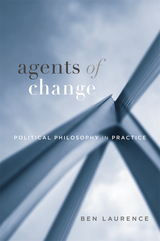
An incisive argument for the relevance of political philosophy and its possibility of effecting change.
The appeal of political philosophy is that it will answer questions about justice for the sake of political action. But contemporary political philosophy struggles to live up to this promise. Since the death of John Rawls, political philosophers have become absorbed in methodological debates, leading to an impasse between two unattractive tendencies: utopians argue that philosophy should focus uncompromisingly on abstract questions of justice, while pragmatists argue that we should concern ourselves only with local efforts to ameliorate injustice. Agents of Change shows a way forward.
Ben Laurence argues that we can combine utopian justice and the pragmatic response to injustice in a political philosophy that unifies theory and practice in pursuit of change. Political philosophy, on this view, is not a purely normative theory disconnected from practice. Rather, political philosophy is itself a practice—an exercise of practical reason issuing in action. Laurence contends that this exercise begins in ordinary life with the confrontation with injustice. Philosophy draws ideas about justice from this encounter to be pursued through political action. Laurence shows that the task of political philosophy is not complete until it asks the question “What is to be done?” and deliberates actionable answers.
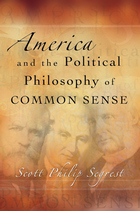
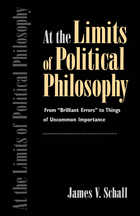
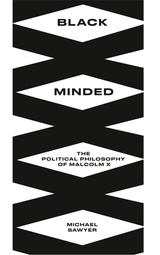
Michael Sawyer argues that the foundational concepts of Malcolm X's political philosophy - economic and social justice, strident opposition to white supremacy and Black internationalism - are often obscured by an emphasis on biography. The text demonstrates the way in which Malcolm X's philosophy lies at the intersection of the thought of W.E.B. Du Bois and Frantz Fanon and is an integral part of the revolutionary politics formed to alleviate the plight of people of African descent globally.
Exploring themes of ontology, the body, geographic space and revolution, Black Minded provides a much-needed appraisal of Malcolm X's political philosophy.
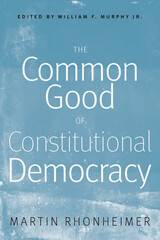

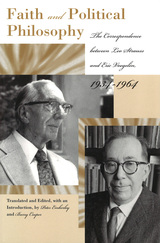
Faith and Political Philosophy consists of fifty-three letters between Leo Strauss and Eric Voegelin, two of the most important political theorists of the twentieth century. In this correspondence, Strauss and Voegelin explore the nature of their similarities and differences, offering insightful observations about one another's work, about the state of the discipline, and about the influences working on them. The letters shed light on many assumptions made in their published writings, often with an openness that removes all vestiges of uncertainty.
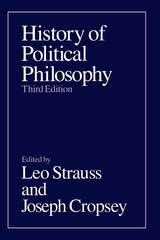
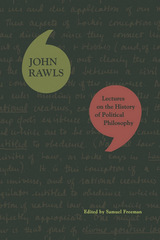
This last book by the late John Rawls, derived from written lectures and notes for his long-running course on modern political philosophy, offers readers an account of the liberal political tradition from a scholar viewed by many as the greatest contemporary exponent of the philosophy behind that tradition.
Rawls's goal in the lectures was, he wrote, "to identify the more central features of liberalism as expressing a political conception of justice when liberalism is viewed from within the tradition of democratic constitutionalism." He does this by looking at several strands that make up the liberal and democratic constitutional traditions, and at the historical figures who best represent these strands--among them the contractarians Hobbes, Locke, and Rousseau; the utilitarians Hume, Sidgwick, and J. S. Mill; and Marx regarded as a critic of liberalism. Rawls's lectures on Bishop Joseph Butler also are included in an appendix. Constantly revised and refined over three decades, Rawls's lectures on these figures reflect his developing and changing views on the history of liberalism and democracy--as well as how he saw his own work in relation to those traditions.
With its clear and careful analyses of the doctrine of the social contract, utilitarianism, and socialism--and of their most influential proponents--this volume has a critical place in the traditions it expounds. Marked by Rawls's characteristic patience and curiosity, and scrupulously edited by his student and teaching assistant, Samuel Freeman, these lectures are a fitting final addition to his oeuvre, and to the history of political philosophy as well.
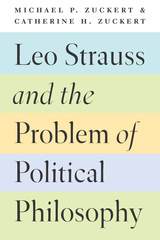
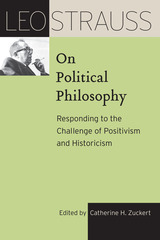
Leo Strauss on Political Philosophy brings together the lectures that comprise Strauss’s “Introduction to Political Philosophy.” Strauss begins by emphasizing the importance of political philosophy in determining the common good of society and critically examining the two most powerful contemporary challenges to the possibility of using political theory to learn about and develop the best political order: positivism and historicism. In seeking the common good, classical political philosophers like Plato and Aristotle did not distinguish between political philosophy and political science. Today, however, political philosophy must contend with the contemporary belief that it is impossible to know what the good society really is. Strauss emphasizes the need to study the history of political philosophy to see whether the changes in the understanding of nature and conceptions of justice that gradually led people to believe that it is not possible to determine what the best political society is are either necessary or valid. In doing so, he ranges across the entire history of political philosophy, providing a valuable, thematically coherent foundation, including explications of many canonical thinkers, such as Auguste Comte and Immanuel Kant, about whom Strauss did not write extensively in his published writings.
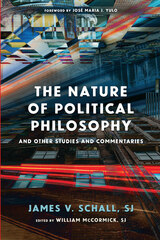

Wars of national secession and ethnic cleansing, based on the claims of supposedly distinct racial, ethnic, cultural, and national identities, have disfigured recent years. Probing the roots of these conflicts, this book provides the first comprehensive survey of the full range of political theories of ethnicity and nationalism.
Paul Gilbert explores the role of identity in configuring contemporary states. He examines the concepts of race, ethnicity, cultural identity, and nationality, as well as the relevant political theories, including liberalism, communitarianism, and postmodernism. He also covers in depth the topics of citizenship and migration, multiculturalism and the ethics of secession. His multidisciplinary approach will be of value to those in philosophy, politics, sociology, and cultural studies.
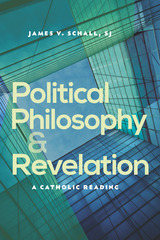
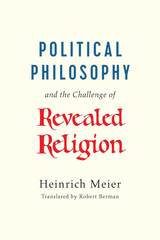
In the first of three chapters, Meier determines four intertwined moments constituting the concept of political philosophy as an articulated and internally dynamic whole. The following two chapters develop the concept through the interpretation of two masterpieces of political philosophy that have occupied Meier’s attention for more than thirty years: Leo Strauss’s Thoughts on Machiavelli and Jean-Jacques Rousseau’s Social Contract. Meier provides a detailed investigation of Thoughts on Machiavelli, with an appendix containing Strauss’s original manuscript headings for each of his paragraphs. Linking the problem of Socrates (the origin of political philosophy) with the problem of Machiavelli (the beginning of modern political philosophy), while placing between them the political and theological claims opposed to philosophy, Strauss’s most complex and controversial book proves to be, as Meier shows, the most astonishing treatise on the challenge of revealed religion. The final chapter, which offers a new interpretation of the Social Contract, demonstrates that Rousseau’s most famous work can be adequately understood only as a coherent political-philosophic response to theocracy in all its forms.

Guiding the reader through the key arguments of the classic figures of Western political philosophy, from Plato through to the modern era, this revised edition includes new essays on Aristotle's 'Politics', Confucianism, Islamic social philosophy and Nazism, as well as additional material on 'Roman Law', Anarchism and 'anti-capitalism'.
Cohen moves chronologically through the development of political philosophy. He presents key texts in their own terms, before offering short, precise analyses of their strengths, weaknesses and influence. The book finishes with a discussion of modern liberalism and conservatism.
Providing both a broad overview and precise summaries of key ideas, this is an invaluable guide for all students of political thought.
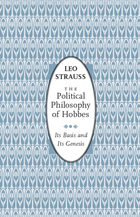
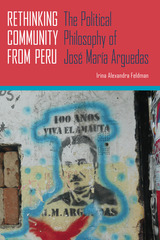
In Rethinking Community from Peru, Irina Alexandra Feldman examines the deep political connotations and current relevance of Arguedas’s fiction to the Andean region. Looking principally to his most ambitious and controversial work, All the Bloods, Feldman analyzes Arguedas’s conceptions of community, political subjectivity, sovereignty, juridical norm, popular actions, and revolutionary change. She deconstructs his particular use of language, a mix of Quechua and Spanish, as a vehicle to express the political dualities in the Andes. As Feldman shows, Arguedas’s characters become ideological speakers and the narrator’s voice is often absent, allowing for multiple viewpoints and a powerful realism. Feldman examines Arguedas’s other novels to augment her theorizations, and grounds her analysis in a dialogue with political philosophers Walter Benjamin, Jean-Luc Nancy, Carl Schmitt, Jacques Derrida, Ernesto Laclau, and Álvaro García-Linera, among others.
In the current political climate, Feldman views the promise of Arguedas’s vision in light of Evo Morales’s election and the Bolivian plurality project recognizing indigenous autonomy. She juxtaposes the Bolivian situation with that of Peru, where comparatively limited progress has been made towards constitutional recognition of the indigenous groups. As Feldman demonstrates, the prophetic relevance of Arguedas’s constructs lie in their recognition of the sovereignty of all ethnic groups and their coexistence in the modern democratic nation-state, in a system of heterogeneity through autonomy—not homogeneity through suppression. Tragically for Arguedas, it was a philosophy he could not reconcile with the politics of his day, or from his position within Peruvian society.

Social and Political Philosophy was first published in 1982. Minnesota Archive Editions uses digital technology to make long-unavailable books once again accessible, and are published unaltered from the original University of Minnesota Press editions.
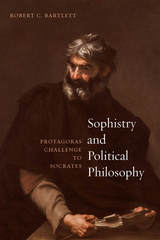
With Sophistry and Political Philosophy, Robert C. Bartlett provides the first close reading of Plato’s two-part presentation of Protagoras. In the “Protagoras,” Plato sets out the sophist’s moral and political teachings, while the “Theaetetus,” offers a distillation of his theoretical and epistemological arguments. Taken together, the two dialogues demonstrate that Protagoras is attracted to one aspect of conventional morality—the nobility of courage, which in turn is connected to piety. This insight leads Bartlett to a consideration of the similarities and differences in the relationship of political philosophy and sophistry to pious faith. Bartlett’s superb exegesis offers a significant tool for understanding the history of philosophy, but, in tracing Socrates’s response to Protagoras’ teachings, Bartlett also builds toward a richer understanding of both ancient sophistry and what Socrates meant by “political philosophy.”
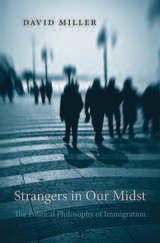
How should Western democracies respond to the many millions of people who want to settle in their societies? Economists and human rights advocates tend to downplay the considerable cultural and demographic impact of immigration on host societies. Seeking to balance the rights of immigrants with the legitimate concerns of citizens, Strangers in Our Midst brings a bracing dose of realism to this debate. David Miller defends the right of democratic states to control their borders and decide upon the future size, shape, and cultural make-up of their populations.
“A cool dissection of some of the main moral issues surrounding immigration and worth reading for its introductory chapter alone. Moreover, unlike many progressive intellectuals, Miller gives due weight to the rights and preferences of existing citizens and does not believe an immigrant has an automatic right to enter a country…Full of balanced judgments and tragic dilemmas.”
—David Goodhart, Evening Standard
“A lean and judicious defense of national interest…In Miller’s view, controlling immigration is one way for a country to control its public expenditures, and such control is essential to democracy.”
—Kelefa Sanneh, New Yorker

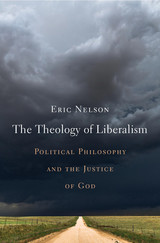
One of our most important political theorists pulls the philosophical rug out from under modern liberalism, then tries to place it on a more secure footing.
We think of modern liberalism as the novel product of a world reinvented on a secular basis after 1945. In The Theology of Liberalism, one of the country’s most important political theorists argues that we could hardly be more wrong. Eric Nelson contends that the tradition of liberal political philosophy founded by John Rawls is, however unwittingly, the product of ancient theological debates about justice and evil. Once we understand this, he suggests, we can recognize the deep incoherence of various forms of liberal political philosophy that have emerged in Rawls’s wake.
Nelson starts by noting that today’s liberal political philosophers treat the unequal distribution of social and natural advantages as morally arbitrary. This arbitrariness, they claim, diminishes our moral responsibility for our actions. Some even argue that we are not morally responsible when our own choices and efforts produce inequalities. In defending such views, Nelson writes, modern liberals have implicitly taken up positions in an age-old debate about whether the nature of the created world is consistent with the justice of God. Strikingly, their commitments diverge sharply from those of their proto-liberal predecessors, who rejected the notion of moral arbitrariness in favor of what was called Pelagianism—the view that beings created and judged by a just God must be capable of freedom and merit. Nelson reconstructs this earlier “liberal” position and shows that Rawls’s philosophy derived from his self-conscious repudiation of Pelagianism. In closing, Nelson sketches a way out of the argumentative maze for liberals who wish to emerge with commitments to freedom and equality intact.
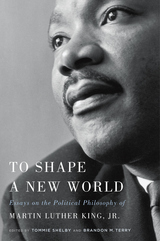
“Fascinating and instructive…King’s philosophy, speaking to us through the written word, may turn out to constitute his most enduring legacy.”
—Annette Gordon-Reed, New York Review of Books
Martin Luther King, Jr., is one of America’s most revered figures, yet despite his mythic stature, the significance of his political thought remains underappreciated. In this indispensable reappraisal, leading scholars—including Cornel West, Martha Nussbaum, and Danielle Allen—consider the substance of his lesser known writings on racism, economic inequality, virtue ethics, just-war theory, reparations, voting rights, civil disobedience, and social justice and find in them an array of compelling challenges to some of the most pressing political dilemmas of our time.
“King was not simply a compelling speaker, but a deeply philosophical intellectual…We still have much to learn from him.”
—Quartz
“A compelling work of philosophy, all the more so because it treats King seriously without inoculating him from the kind of critique important to both his theory and practice.”
—Los Angeles Review of Books
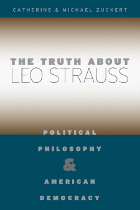
Is Leo Strauss truly an intellectual forebear of neoconservatism and a powerful force in shaping Bush administration foreign policy? The Truth about Leo Strauss puts this question to rest, revealing for the first time how the popular media came to perpetuate such an oversimplified view of such a complex and wide-ranging philosopher. More important, it corrects our perception of Strauss, providing the best general introduction available to the political thought of this misunderstood figure.
Catherine and Michael Zuckert—both former students of Strauss—guide readers here to a nuanced understanding of how Strauss’s political thought fits into his broader philosophy. Challenging the ideas that Strauss was an inflexible conservative who followed in the footsteps of Nietzsche, Heidegger, and Carl Schmitt, the Zuckerts contend that Strauss’s signature idea was the need for a return to the ancients. This idea, they show, stemmed from Strauss’s belief that modern thought, with its relativism and nihilism, undermines healthy politics and even the possibility of real philosophy. Identifying this view as one of Strauss’s three core propositions—America is modern, modernity is bad, and America is good—they conclude that Strauss was a sober defender of liberal democracy, aware of both its strengths and its weaknesses.
The Zuckerts finish, appropriately, by examining the varied work of Strauss’s numerous students and followers, revealing the origins—rooted in the tensions within his own thought—oftheir split into opposing camps. Balanced and accessible, The Truth about Leo Strauss is a must-read for anyone who wants to more fully comprehend this enigmatic philosopher and his much-disputed legacy.
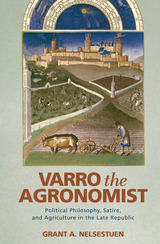
On one level, Varro’s treatise presents an innovative account of the Roman farm, which rationalizes new agricultural and pastoral opportunities for contemporary elite owners of large-scale estates. But on another level, this bold agronomical vision associates the farm’s different spheres with distinct areas under Roman control, thereby allegorizing Rome’s empire on the model of a farm. Nelsestuen argues that Varro’s treatise thus provides his contemporaries with a model for governing the Roman state, anticipates Augustus’ subsequent transformation of Roman dominion into a coherent territorial state, and offers an ancient theory of imperialism.
Shedding new light on the only completely extant work of a much-celebrated but ill-understood figure, Varro the Agronomist has much to offer to those interested in Latin literature—especially, Cicero and Vergil—as well as on the political dimensions of intellectual life in first-century bce Rome, ancient imperialism, and Roman political philosophy.
READERS
Browse our collection.
PUBLISHERS
See BiblioVault's publisher services.
STUDENT SERVICES
Files for college accessibility offices.
UChicago Accessibility Resources
home | accessibility | search | about | contact us
BiblioVault ® 2001 - 2024
The University of Chicago Press









